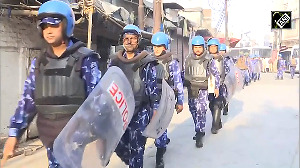Federico Trillo, the Spanish defence minister, had a press conference in Madrid on December 10, 2002. He said a North Korean ship "So San" (some reports have described it as a Cambodian vessel) carrying 15 Scud missiles in broken down condition and around 85 drums of an undetermined chemical bound for a West Asian port, was intercepted the previous day in the Gulf of Aden by Spanish naval vessels and handed over to officials of the US Navy for investigation. [President Bush subsequently ordered the Navy to release the ship.]
The Reuters report from Washington DC ran as follows: "A North Korean cargo vessel flying no flag was halted on Monday in the Gulf of Aden by two Spanish warships and a search revealed Scud missiles hidden beneath sacks of cement, senior administration and Pentagon officials said on Wednesday. The ship, which a senior Administration official said had been tracked by US intelligence all the way out from North Korea, appeared to be heading for Yemen, when it was stopped by the Spanish warships, an estimated 600 miles off the Yemeni coast."
US Deputy Secretary of State Richard Armitage, who was on a visit to Beijing when the news of the interception was announced in Washington DC, described the interception as proof of North Korea's agenda of proliferation.
In his statement, Yemeni Foreign Minister Abubakr al-Qirbi, said: "The shipment belongs to the Yemeni government and its army and is meant for defensive purposes." He did not explain as to why the shipment was sought to be made in a clandestine manner without declaring the nature of the cargo in the ship's documents.
In May, 2002, Saudi security guards were reported to have found a missile-launcher tube about two miles from a runway at a desert air base, south of the Saudi capital of Riyadh, used by US Air Force planes. The Agence France-Presse (AFP), quoting a Saudi dissident, reported that dozens, if not hundreds, of Saudis linked to Al Qaeda were in detention in the kingdom and that in one of the cases, "between six and 15 people," all Saudis, were arrested four months ago on suspicion of smuggling shoulder-held missiles from Yemen.
The missile launcher was used by unidentified terrorists suspected to be from Osama bin Laden's International Islamic Front (IIF), for firing a missile at an Israeli plane carrying tourists as it took off from Mombasa airport last month. The missile missed the plane and was suspected of being smuggled into Mombasa from Yemen.
US intelligence has since the beginning of this year been closely monitoring all ships and fishing vessels moving towards Yemen to foil any attempt by bin Laden and other members of Al Qaeda from escaping from Pakistan to Yemen by sea and to smuggle out weapons, particularly missiles, belonging to them. Even though the Government of Yemen has been ostensibly cooperating with the US in its operations against Yemen-based dregs of Al Qaeda, IIF and the US has praised Yemen's cooperation openly, US intelligence officials reportedly suspect that the cooperation has not been whole-hearted. That the Yemeni intelligence, or at least some sections of it, have been helping the terrorists on the sly while making a pretence of cooperating with the US.
The US has also been closely monitoring all ships originating from North Korea to detect missile shipments bound for the Gulf region, lest some of these missiles find their way into the arsenal of Saddam Hussein, or Pakistan -- particularly after it was established that in return for the supply of missiles, Pakistan has clandestinely transferred equipment and technology to North Korea for enrichment of weapon-grade uranium.
How should the proliferation of North Korean missiles to Iran, Syria, Libya and Pakistan be stopped, is a subject that has been under discussion in the US Administration and Congress since 1998. In the past, Pakistan had been receiving its clandestine missile consignments from China and North Korea by sea.
Since the appointment of Richard Armitage in the current Bush Administration, Pakistan and North Korea have been worried because in a paper on US policy options towards North Korea submitted to the US House of Representatives on March 4,1999, Armitage, then a private security consultant, had, inter alia, recommended: "Should diplomacy fail, the United States would have to consider two alternative courses, neither of which is attractive. One is to live with and deter a nuclear North Korea armed with delivery systems, with all its implications for the region. The other is preemption, with the attendant uncertainties. This would involve a more ready and robust posture, including a willingness to interdict North Korean missile exports on the high seas."
Ever since the Bush Adiminstration came to office in the beginning of 2001, Pakistan has started getting many of its missile supplies from China by road along the Karakoram highway. The Washington Times reported on August 6, 2001, that American satellite monitoring of the area had detected a movement of 12 consignments of Chinese missiles by truck on May 1 on the China-Pakistan border. Though ships and aircraft are still used, the reliance on them is being reduced.
During the visit of the Chinese prime minister, Zhu Rongji, to Pakistan in May, 2001, Islamabad had reportedly taken up with China the question of allowing future missile consignments from North Korea to come to Pakistan by road via China and the Northern Areas of Pakistan through the Karakoram highway. China apparently agreed to this.
In the beginning of this year, after India mobilised its troops on the Pakistani border increasing fears of a possible war over Pakistani sponsorship of terrorism in Indian territory, North Korea reportedly rushed fresh consignments of missiles to Pakistan by road. In addition to this, at least one consignment was moved by air in July 2002.
It is likely that after the interception of the Yemen-bound consignment by the Spanish vessels at the request of the US, Pakistan will in future totally avoid the use of planes and ships and rely only on the Karakoram highway for the movement of sensitive nuclear and missile supplies.






 © 2025
© 2025